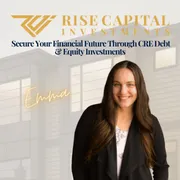Rise Capitals Articles To Educate And Inspire

Learning to Trust
"Trust is not just a moral choice; it's a pivotal linchpin in achieving financial freedom through real estate investing."
Rise Capital Investments
What 2 key principles will help you decide when, how, and where you work?
Hint: they're not financial.
They're about how to learn to trust others.
You already do it every time you drive with other drivers on the road, every time you pass by heavy equipment with an operator inside the cab, every time you go to a hospital, every time you invest in the stock market.
How can you find that trust financially in real estate to build your portfolio to the point you can reach financial freedom, retire early if you choose, and be in charge of your own life decisions?
If you are a fan of Stephen Covey, you'll know that his son Stephen M. also writes amazing books. One life changer is "The Speed of Trust."
I had to read it in business school, but I'm not going to write a book report for you (my 8th grade English teacher would be so disappointed!)
BUT
I am going to show you how to RETIRE EARLY using TRUST.
Covey's 2 key principles to building trust are:
Character: Integrity and Intent
Competence: Capability, Skills, and Results
You know your own character, so if you are holding off on making more passive investments, most likely what you doubt is your own competence in evaluating how to trust others' character and capability.
Here's WHY self trust is so important!👇🏻
Self trust is the foundation of trusting others.
Covey discusses the layers of trust and how each of these levels builds on the level before. Lack of self trust in our own capabilities at the first level can topple the process to trusting others.
Self Trust creates: Confidence in Oneself
Relationship Trust creates: Consistent Expectations
Organizational Trust creates: Cohesion in the Group
Market Trust creates: Credibility in Competitive Markets
Societal Trust creates: Contribution and Fulfillment
Trusting relationships in organizations and markets is critical to developing the highest fulfillment of being a part of a greater cause in society, being able to specialize in what you do while other specialize in what they do.
Benefiting From Trust
Did you know that if you can develop trust in others who are experts at what they do, you can invest in real estate passively just like in the stock market, where you research beforehand and then trust operational control to the business owners?
Research
The best deals go fast, so to be poised and ready to invest when those opportunities arise, we must prepare our trust in advance.
Research operators, not opportunities. Book calls with several, decide on a few to invest with, subscribe to their email deal notification lists, and go through the portal sign up and paperwork process.
Once you have those items done, you'll be able to start looking at specific opportunities as they come through the handful of organizations you've decided to invest with. After getting familiar with what's normal, you'll be able to identify what's better than normal to be ready to jump in and fund the deal.
You Decide
Many real estate investors struggle to invest as passive limited partners as we readily do in the stock market because they cannot TRUST others, unable or refuse to give up control in exchange for truly passive income. Owning 2-10 rental units is often a great idea for active investing and can be a great side hustle in addition to a job or business, but more than that starts to turn into your full-time gig.
If you don't want to become a real estate career entrepreneur, it's vital to consider and research other options to invest passively in properties, investing in a business with an expert that you don't have to run.
There's no other way around it if you ever want to become work optional at any age.
Balancing a full-time career, a part-time side hustle, and a personal life is tricky. Allowing others into your portfolio to take care of your investment for you is normal in the stock market, and can become normal for you in real estate as well.
When you are ready to add passive real estate to your investing plan, we are here to walk you through it.

